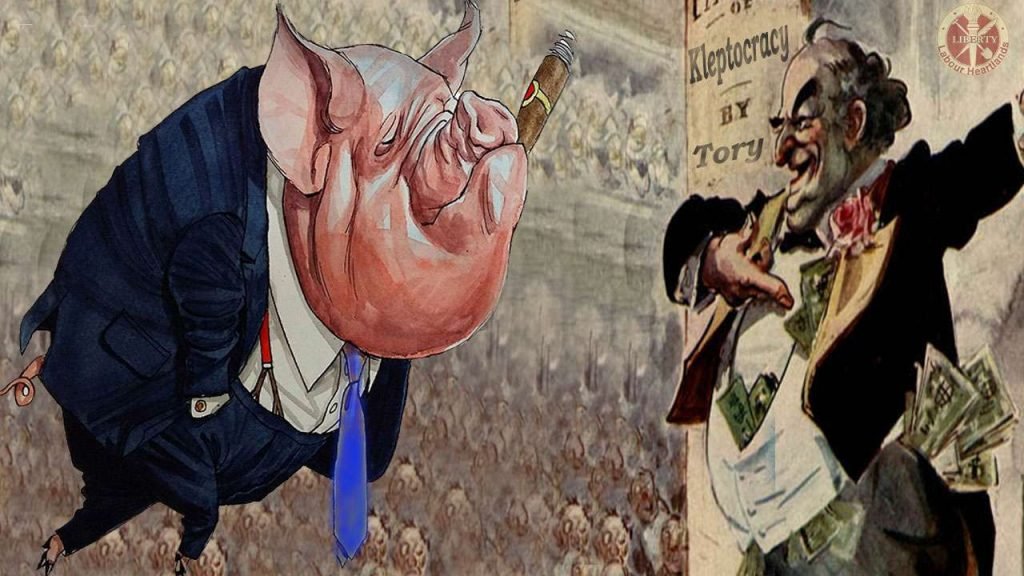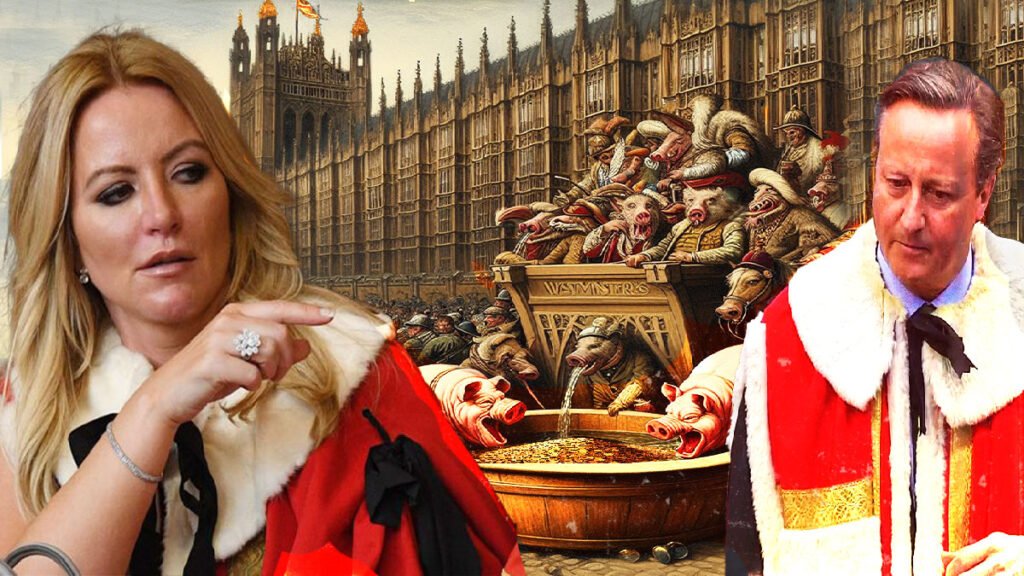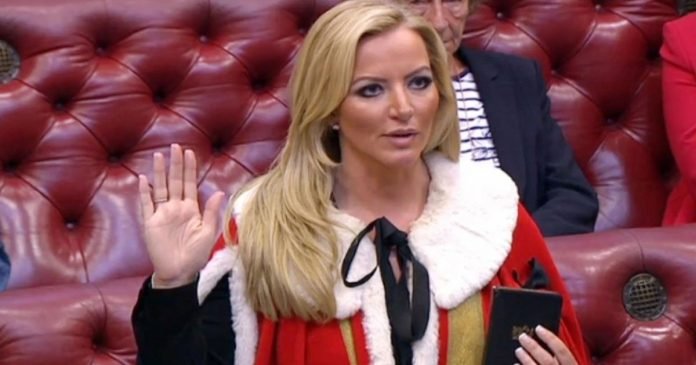When Profiteering Meets Pandemic: The Mone-Barrowman PPE Scandal Reaches Its Reckoning
A company linked to Conservative peer Baroness Michelle Mone has been ordered to repay £121.9 million after the High Court ruled it breached a government contract to supply surgical gowns during the COVID-19 pandemic. The ruling exposes not just contractual failure but the systematic corruption of procurement processes during Britain’s deadliest public health crisis in a century.
PPE Medpro, a consortium led by Mone’s husband Doug Barrowman, supplied 25 million gowns that the Department of Health and Social Care described as “faulty” and non-sterile. Wednesday’s High Court judgment confirmed the gowns did not comply with requirements for validated sterility processes, making them unusable and unsellable by the DHSC.
The company’s route to this lucrative contract tells the real story. Baroness Mone personally recommended PPE Medpro to ministers, securing its place on the now-infamous “VIP lane” for PPE offers. This fast-track process, ostensibly created to expedite urgent supplies, became a vehicle for preferential treatment of politically connected firms regardless of experience or capability.

Mone initially denied any involvement with the company or the procurement process, a lie exposed when documents revealed she was the “source of referral” for the VIP lane placement. This pattern of denial followed by reluctant admission characterised the entire scandal, suggesting consciousness of wrongdoing despite protestations of innocence.
Neither Mone nor Barrowman gave evidence at June’s trial, a telling absence given their vociferous public complaints about unfair treatment. Yesterday, Mone issued a lengthy online tirade accusing the government of making them a “poster couple for the PPE scandal”, an accusation with unintentional accuracy. They became poster figures precisely because their case exemplified everything wrong with pandemic procurement: political connections trumping competence, vast sums for defective equipment, and initial denials crumbling under scrutiny.
Barrowman’s response to the ruling combined defiance with conspiracy theory. He called it “a travesty of justice” and claimed the judgment “bears little resemblance to what actually took place” at trial, insisting their gowns were sterile despite the court’s findings. His assertion that “this case was simply too big for the government to lose” frames accountability as establishment persecution rather than consequence for contractual breach.
The government sought not only the £121.9 million repayment but an additional £8.6 million for transport and storage costs. The High Court denied the latter claim, finding the loss unproven, a small victory for PPE Medpro that Barrowman will likely inflate into vindication despite losing the substantive case.
PPE Medpro’s counterclaim that the DHSC should have advised it on contract compliance failed entirely, exposing the absurdity of their position. A company awarded a £122 million government contract during a national emergency claimed it needed guidance on meeting basic sterility requirements. This suggests either spectacular incompetence or cynical attempt to shift blame for their own failures.
The company announced plans to appoint an administrator ahead of the ruling, convenient timing that may complicate repayment efforts. Barrowman’s spokesman indicated willingness to negotiate with administrators over the owed sum, though “backers of PPE Medpro have always tried to negotiate with DHSC.” This framing positions them as reasonable actors seeking resolution, ignoring that negotiation typically follows admission of error rather than denying wrongdoing while simultaneously entering administration.
Chancellor Rachel Reeves welcomed the ruling unequivocally: “We want our money back. We are getting our money back. And it will go where it belongs – in our schools, NHS and communities.” The statement connects pandemic profiteering to current austerity, making explicit that every pound lost to fraudulent contracts represents resources denied to essential services.
COVID-19 Bereaved Families for Justice UK offered starker judgment: “Profiting and corruption during the pandemic cost lives. Those responsible must be held to account.” This cuts through legal technicalities to the human reality, while families watched loved ones die in overwhelmed hospitals, politically connected firms secured contracts for defective equipment they could never properly deliver.
The broader context makes this case even more damning. Mone was created a life peer in 2015 following her work as David Cameron’s “entrepreneurship tsar.” Her elevation to the Lords was meant to reward business success and provide expertise to governance. Instead, she used her position to enrich herself and her husband during national crisis, then lied about her involvement when questioned.

The VIP lane itself represents institutional corruption on breathtaking scale. Rather than prioritizing firms with relevant experience, capacity, and quality standards, the system fast-tracked politically connected operators. The inevitable result: massive payments for unusable equipment while NHS staff risked their lives with inadequate protection.
Barrowman’s complaints about “establishment” bias ring hollow given that he and Mone benefited from the ultimate establishment privilege, direct ministerial access through peerage connections. Their current victimhood narrative attempts to recast consequence as persecution, accountability as injustice.
The appointment of administrators before judgment suggests sophisticated financial planning designed to frustrate repayment. Creating corporate structures that can declare insolvency while principals retain wealth represents the privatisation of profit and socialisation of loss, a pattern depressingly familiar in British business culture.
The scale of this transfer demands emphasis. COVID-19 witnessed probably the biggest movement of public money into private hands since the 2008 financial crash, when taxpayers bailed out banks that had gambled with the economy. Then, at least, the justification was preventing systemic collapse. During the pandemic, vast sums flowed to politically connected firms with no track record in PPE provision, no quality controls, and often no delivered products. The National Audit Office identified £10.5 billion in pandemic-related fraud and error, a conservative estimate that captures only the most obvious cases. Contracts worth billions went to companies created weeks before winning government tenders, to firms with directors linked to Conservative Party donors, to associates of ministers and peers. The VIP lane alone processed offers worth £3.8 billion, with success rates dramatically higher than the standard route despite no evidence of superior capability.

This wasn’t emergency procurement gone slightly wrong, it was systematic looting of the public purse while the nation faced its gravest crisis in generations. Every fraudulent contract represented resources denied to frontline healthcare, protective equipment that never arrived for workers risking their lives, and bereaved families watching loved ones die while profiteers counted their winnings.
This ruling matters not just for the specific sum recovered but for establishing that pandemic profiteering carries consequences. Too many VIP lane contracts remain unexamined, too many politically connected firms escaped with public money for defective or never-delivered supplies. Each successful prosecution or civil judgment makes future corruption marginally more difficult.
Yet the broader lesson remains unlearned. The same political class that created VIP lanes and awarded contracts to cronies now lectures the public about fiscal responsibility and austerity. The same institutions that permitted systematic looting during national emergency now demand cuts to disability benefits and public services.
Mone and Barrowman’s greatest crime wasn’t just taking £122 million for useless gowns, it was doing so while healthcare workers risked their lives with inadequate protection, while patients died alone in overwhelmed hospitals, while the nation united in collective sacrifice that they exploited for personal gain.
Their current complaints about unfair treatment reveal sociopathic detachment from the suffering their actions caused. Families who lost loved ones to COVID-19 might find it difficult to sympathize with wealthy businesspeople forced to repay money obtained through defective contracts secured via political connections.
The High Court has delivered accountability in this case. Whether broader reforms emerge to prevent similar corruption in future crises remains doubtful. The VIP lane wasn’t aberration but symptom, evidence of how quickly democratic safeguards dissolve when elites see opportunity for profit in public emergency.
Baroness Mone and Doug Barrowman became poster figures for the PPE scandal because they earned that distinction through their actions. The court has now confirmed what bereaved families knew all along: profiteering during pandemic cost lives, and those responsible must be held to account.
Yet accountability in Britain operates on a peculiar sliding scale. Ordinary citizens face prosecution for benefit fraud measured in hundreds of pounds while peers who pocket millions through defective pandemic contracts retain their ermine and their seats in Parliament’s upper chamber. One waits in vain for the petition demanding Mone’s prompt removal from the House of Lords, though perhaps that’s fitting for an institution that epitomizes everything wrong with British governance.
The Lords itself stands as monument to privilege without accountability, influence without election, power without democratic mandate. An appointed chamber stuffed with party donors, failed politicians, and apparently, pandemic profiteers who lied about their involvement in £122 million contracts for unusable equipment. It’s less a legislative body than a palace of varieties, where the only qualification for membership seems to be knowing the right people or writing the right cheques.
Whether broader reforms emerge to prevent similar corruption in future crises remains doubtful. The VIP lane wasn’t aberration but symptom, evidence of how quickly democratic safeguards dissolve when elites see opportunity for profit in public emergency. Until we address not just individual corruption but the institutional structures that enable and protect it, the next crisis will produce its own cast of profiteers, equally confident that their connections will shield them from consequence. Mone’s judgment offers a rare glimpse of accountability. Whether it becomes precedent or anomaly depends on whether we finally find the courage to dismantle the systems that made her crimes possible.
Support Independent Journalism Today
Our unwavering dedication is to provide you with unbiased news, diverse perspectives, and insightful opinions. We're on a mission to ensure that those in positions of power are held accountable for their actions, but we can't do it alone. Labour Heartlands is primarily funded by me, Paul Knaggs, and by the generous contributions of readers like you. Your donations keep us going and help us uphold the principles of independent journalism. Join us in our quest for truth, transparency, and accountability – donate today and be a part of our mission!
Like everyone else, we're facing challenges, and we need your help to stay online and continue providing crucial journalism. Every contribution, no matter how small, goes a long way in helping us thrive. By becoming one of our donors, you become a vital part of our mission to uncover the truth and uphold the values of democracy.
While we maintain our independence from political affiliations, we stand united against corruption, injustice, and the erosion of free speech, truth, and democracy. We believe in the power of accurate information in a democracy, and we consider facts non-negotiable.
Your support, no matter the amount, can make a significant impact. Together, we can make a difference and continue our journey toward a more informed and just society.
Thank you for supporting Labour Heartlands









